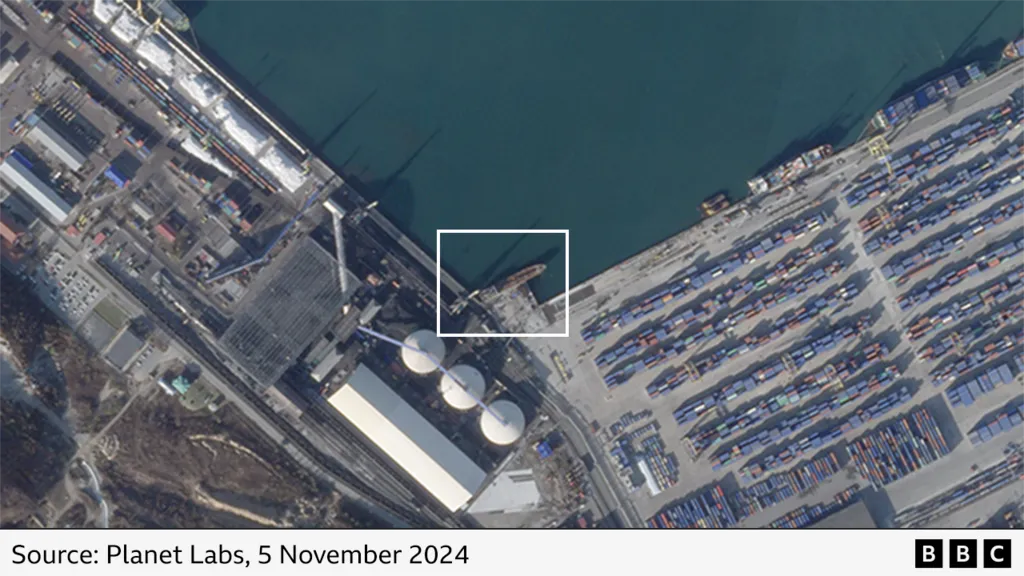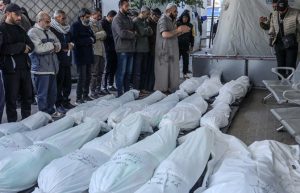Based on this, they calculate that, since March, Russia has given North Korea more than a million barrels of oil – more than double the annual cap, and around ten times the amount Moscow officially gave Pyongyang in 2023.
This follows an assessment by the US government in May that Moscow had already supplied more than 500,000 barrels’ worth of oil.
Cloud cover means the researchers cannot get a clear image of the port every day.
“The whole of August was cloudy, so we weren’t able to document a single trip,” Mr Byrne says, leading his team to believe that one million barrels is a “baseline” figure.
A ‘new level of contempt’ for sanctions
Not only do these oil deliveries breach UN sanctions on North Korea, that Russia, as a permanent member of the UN Security Council, signed off on – but also, more than half of the journeys tracked by the Open Source Centre were made by vessels that have been individually sanctioned by the UN.
This means they should have been impounded upon entering Russian waters.
But in March 2024, three weeks after the first oil transfer was documented, Russia disbanded the UN panel responsible for monitoring sanctions violations, by using its veto at the UN Security Council.
Ashley Hess, who was working on the panel up until its collapse, says they saw evidence the transfers had started.
“We were tracking some of the ships and companies involved, but our work was stopped, possibly after they had already breached the 500,000-barrel cap”.
Eric Penton-Voak, who led the group from 2021-2023, says the Russian members on the panel tried to censor its work.
“Now the panel is gone, they can simply ignore the rules,” he adds. “The fact that Russia is now encouraging these ships to visit its ports and load up with oil shows a new level of contempt for these sanctions.”
But Mr Penton-Voak, who is on the board of the Open Source Centre, thinks the problem runs much deeper.
“You now have these autocratic regimes increasingly working together to help one another achieve whatever it is they want, and ignoring the wishes of the international community.”
This is an “increasingly dangerous” playbook, he argues.
“The last thing you want is a North Korean tactical nuclear weapon turning up in Iran, for instance.”
Oil the tip of the iceberg?
As Kim Jong Un steps up his support for Vladimir Putin’s war, concern is growing over what else he will receive in return.
The US and South Korea estimate Pyongyang has now sent Moscow 16,000 shipping containers filled with artillery shells and rockets, while remnants of exploded North Korean ballistic missiles have been recovered on the battlefield in Ukraine.
More recently, Putin and Kim signed a defence pact, leading to thousands of North Korean troops being sent to Russia’s Kursk region, where intelligence reports indicate they are now engaged in battle.
The South Korean government has told the BBC it would “sternly respond to the violation of the UN Security Council resolutions by Russia and North Korea”.
Its biggest worry is that Moscow will provide Pyongyang with technology to improve its spy satellites and ballistic missiles.
Last month, Seoul’s defence minister, Kim Yong-hyun, stated there was a “high chance” North Korea was asking for such help.
“If you’re sending your people to die in a foreign war, a million barrels of oil is just not sufficient reward,” Dr Go says.
Andrei Lankov, an expert in North Korea-Russia relations at Seoul’s Kookmin University, agrees.
“I used to think it was not in Russia’s interest to share military technology, but perhaps its calculus has changed. The Russians need these troops, and this gives the North Koreans more leverage.”








